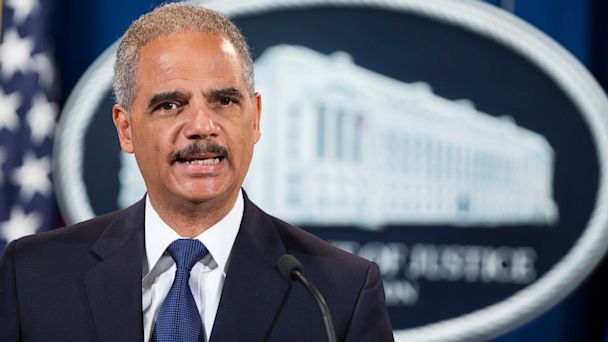Justice Department To Sue N.C. Over Voting Law

Attorney General Eric Holder speaks during a news conference at the Justice Department in Washington, Sept. 30, 2013, announcing a new action to protect voting rights. (Manuel Balce Ceneta/AP Photo)
The Justice Department will file a lawsuit against North Carolina for its strict new voting law, Attorney General Eric Holder announced today.
"By restricting access and ease of voter participation, this new law would shrink, rather than expand, access to the franchise," Holder said during a news conference.
The lawsuit comes months after the Supreme Court - in Shelby County v. Holder - struck down a key provision of the Voting Rights Act and weakened the federal government's ability to oversee (or "pre-clear") changes in voting procedures in states with a history of discrimination.
North Carolina's law - which was signed in August - would never have been able to go into effect before the Supreme Court's decision in that case, said election law expert Rick Hasen.
"Forty of North Carolina's counties were covered by the pre-clearance requirement before Shelby County, and a draconian law like this would never have made it past the Justice Department," Hasen, a professor at the University of California Irvine School of Law, wrote recently in Slate Magazine.
The Justice Department plans to use different provisions of the Voting Rights Act to fight North Carolina's law, Holder said.
He said the evidence will show "that the North Carolina General Assembly enacted this legislation despite having evidence before it that these changes would make it harder for many minority voters to participate in the electoral process."
The lawsuit seeks to block enforcement of four provisions of the law, including the strict photo ID law that the Justice Department argues does not have adequate protections for those voters who lack the required ID. The lawsuit also targets the elimination of the first week of early voting, the elimination of same-day voter registration during the early voting period, and the prohibition on counting certain provisional ballots.
The burden to make the case will be heavier, Hasen said, because of a higher standard necessary to prove discrimination.
North Carolina Gov. Pat McCrory has defended the law, and addressed the issue in a news conference today.
"I'm very disappointed that the Justice Department has chosen to challenge a law that includes provisions such as voter ID as is used in other states throughout our great country," McCrory said.
"This lawsuit will only result in costly legal bills and drawn out legal battles for both state and federal taxpayers. Protecting the integrity of every vote is one of the most important duties I have as governor of this great state. And that is why I signed this common sense legislation into law," McCrory added.
In August, he wrote an op-ed for USA Today in which he argued: "In reality, the legislation I signed into law keeps North Carolina in the mainstream of election law, not the fringes."
"Photo ID has made flying safer and prevents fraud in government programs," the North Carolina governor also said in the op-ed. "Photo ID has become a part of everyday life in America, and our individual vote deserves the same protection."
This would not be the first time that the government has filed suit since the Shelby County case. Earlier in the summer, the department filed two lawsuits against the state of Texas regarding laws that had previously been blocked by federal courts.
ABC News' Michael Levine contributed to this story.